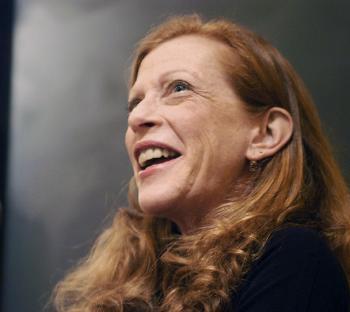
News
HMS Is Facing a Deficit. Under Trump, Some Fear It May Get Worse.

News
Cambridge Police Respond to Three Armed Robberies Over Holiday Weekend

News
What’s Next for Harvard’s Legacy of Slavery Initiative?

News
MassDOT Adds Unpopular Train Layover to Allston I-90 Project in Sudden Reversal

News
Denied Winter Campus Housing, International Students Scramble to Find Alternative Options
Orlean’s Journeys on the Page
Adaptation inspiration describes travels around the world

“One day my editors at Outside called me and said, ‘Where in the world do you want to go?’ and I said, “I don’t know, I just feel like climbing Mt. Fuji. So the next thing I know, I’m climbing Mt. Fuji.”
Such is the life of Susan Orlean, a staff writer at The New Yorker and author of The Orchid Thief, on which the movie Adaptation is based. Last Wednesday evening, a crowd of fans slogged through the rain to the Brattle Theater to hear Orlean read selections from her latest book My Kind of Place: Travel Stories from a Woman Who’s Been Everywhere, a collection of short pieces that Orlean has written over the years, all dealing with the theme of “journeys.”
How does one woman get the chance to “go everywhere?” The pieces in My Kind of Place have a range of settings, from a Manhattan high school a few blocks from Orlean’s home to a trailer park in Portland, Oregon to, yes, Mt. Fuji, with a focus on the subcultures that flourish out of the common view.
Orlean’s work as a reporter consists of picking a topic, be it a person or a place, and then learning about it. “There’s nothing I love more than discovering a subculture that is thriving without my even knowing it,” she said.
According to Orlean, her writing is “factual reporting…but the technique draws more from the tradition of narrative fiction. In the last 20 or 30 years there’s been a struggle to come up for a name for it. I guess narrative nonfiction is the safest, but I’m not really comfortable with any of them. It’s based in reporting, and then it relies on a strong voice.”
Orlean’s work occupies a place that lies somewhere between newsreporting, the personal essay and sociological ethnography. If she does not fit easily into a prefabricated category of writer, it’s because she’s carved out this niche for herself. “One of the things that’s so hard about wanting to be a writer is that you don’t apply for a job as a narrative nonfiction essayist,” Orlean said, laughing.
Rather, Orlean began with a clear idea of what she wanted to write and then, to put it bluntly, just started writing about it. True, luck may have had something to do with it, not to mention the practical savvy to know that her approach would catch on.
“I went to publishers and said I want to do a book about how different subcultures spend a Saturday night,” Orleans said of her first book, Saturday Night, published in 1990. “Instead of being intimidated by its not fitting into a genre, I just thought, this is a good idea for a book.”
The good idea went far. Since publishing Saturday Night, Orlean has added a long list of titles to her repertoire. In addition, she has continued to write for an array of magazines, from Rolling Stone to Esquire.
Though her subject matter may be overwhelmingly diverse, in reality Orlean has continued to pursue the same line of inquiry that started her off on her career: to learn about people and places that aren’t mainstream. “It seems a really wonderful mission to try to bring people out of their own worlds and encourage them to at least sample another world that they don’t have much in common with,” Orlean said.
For example, one of the pieces in My Kind of Place expounds on the joys of taxidermy. Orlean visited the world taxidermy championships and to her surprise became thoroughly enthused by her subject, at least for the duration of the competition.
Orlean’s willingness to engage with new worlds is contagious to readers. The humor, vivacity and fair-mindedness of her writing lead readers into worlds where they never thought they’d find themselves. According to Orlean, “The greatest compliment is when someone says, ‘I didn’t think I’d be interested in this but I ended up reading this essay all the way to the end!’”
Orlean’s brand of writing, then, springs from both a natural personal interest in the unfamiliar and a desire to open new worlds for readers. “As a writer, you’re always making choices, and the very first choice you make is what you deem worth writing about,” Orlean commented.
For Orlean, the goal of the writing is “to be able to gently lead people into reading about a world that they don’t know about or didn’t think they could care about.” So go ahead, give the taxidermy story a read-through—you may find yourself competing in the next championship.
Want to keep up with breaking news? Subscribe to our email newsletter.
